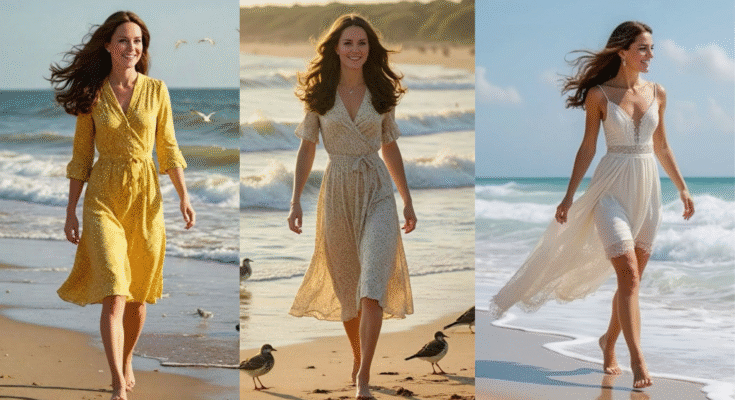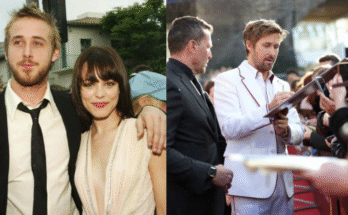Freedom, Unity, and the Rise of an Irish Icon
Saoirse Una Ronan (born 12 April 1994) is an American-born Irish actress. Primarily known for her work in period dramas, she has received various accolades, including a Golden Globe Award, with nominations for four Academy Awards and seven British Academy Film Awards.
Her name itself carries profound meaning—Saoirse means “freedom” in Irish, Una means “unity,” and Ronan means “little seal.” These aren’t just beautiful words; they encapsulate the essence of an actress who has brought independence, grace, and authenticity to every character she portrays.
At just thirty years old, Saoirse Ronan has accomplished what takes most actors an entire lifetime to achieve. She has been nominated for four Academy Awards, won a Golden Globe, earned seven BAFTA nominations, and become one of Hollywood’s most respected and sought-after actresses. Yet what makes her achievement even more remarkable is that she accomplished this while maintaining fierce independence, refusing social media, and insisting on choosing roles based on character depth rather than commercial appeal.
Her story is one of immigrant dreams, artistic dedication, and the power of storytelling to transcend borders and cultures.
The American Dream That Returned to Ireland
Saoirse Una Ronan was born in the Bronx borough of New York City on April 12, 1994, the only child of Irish parents Monica (née Brennan) and Paul Ronan, both from Dublin. Her father worked in construction and in bars before training as an actor in New York, and her mother worked as a nanny and had acted as a child. Her parents were undocumented immigrants who had left Ireland due to the recession of the 1980s, and struggled economically during their time in New York. The family moved back to Dublin when Ronan was three years old.
The American Dream was supposed to work for her parents. They had sacrificed everything—their home, their family in Dublin, their security—to create better lives in America. They worked hard jobs. They survived. But America in the late 1980s and early 1990s was not hospitable to struggling immigrants. The economic reality did not match the romantic ideal.
When Saoirse was three years old, the family made the difficult decision to return to Ireland. She was raised in Ardattin, County Carlow, where she attended Ardattin National School. Her parents later had her tutored privately at home. In her early teens, Ronan was living again in Dublin with her parents, who settled in the seaside village of Howth.
The move seemed like a return to humble origins, a step backward. Instead, it became the foundation for everything that would follow. Growing up in Ireland during the 1990s and 2000s meant growing up in a country undergoing profound cultural transformation. The Irish economy was beginning its renaissance. Irish culture was gaining international recognition. For a child with artistic parents, Ireland offered something America had not fully provided—a sense of cultural identity, artistic heritage, and the kind of creative ecosystem where young talent could flourish.
The Beginning: Child Actor in Irish Television
Ronan made her acting debut in 2003 on the Irish medical drama series The Clinic and had her breakthrough role as a precocious teenager in the period drama film Atonement (2007), which earned her a nomination for the Academy Award for Best Supporting Actress.

Rather than thrust into the celebrity mill that often destroys young actors, she remained in Ireland, working in small television productions that allowed her to learn her craft in relative obscurity. She wasn’t photographed constantly. She wasn’t expected to embody a public persona. She was simply an acting student learning by doing.
The film industry takes note of talented young actors, however, regardless of where they work. By 2007, when she was thirteen years old, Saoirse had progressed to film roles that would change her life forever.
The Breakthrough: Atonement and the Precocious Genius
She auditioned for and won the part of Briony Tallis, a 13-year-old aspiring novelist, who affects several lives by accusing her sister’s lover of a crime he did not commit. She acted alongside Keira Knightley and James McAvoy. Budgeted at US$30 million, the film earned over US$129 million worldwide. Ty Burr of The Boston Globe called her “remarkable [and] eccentric”, and Christopher Orr of The Atlantic wrote that she is “a marvel, elegantly capturing the narcissism and self-doubt that adhere to precocity”.
The role of Briony Tallis is not a sympathetic character. She is narcissistic, immature, and her false accusation ruins lives. What Saoirse understood at thirteen was that characters don’t need to be likeable to be compelling. They need to be truthful. She needed to show Briony’s narcissism not as villainy, but as the natural self-absorption of a gifted, imaginative child who mistakes her internal world for external reality.
The performance earned her three major nominations: a BAFTA, a Golden Globe, and an Academy Award nomination for Best Supporting Actress. At thirteen, she became one of the youngest Academy Award nominees in that category. Critically, reviewers praised her not for cuteness or precocity, but for capturing the psychological truth of a complex character.
The Expansion: Finding Range Across Genres
After Atonement’s success, Saoirse had choices. She could have followed the typical path of the child star. Instead, she chose deliberately challenging material across diverse genres.
The Difficult and Dark Roles
Ronan played the daughter of an impoverished psychic (played by Catherine Zeta-Jones) in the supernatural thriller Death Defying Acts (2007) and starred as Lina Mayfleet, a heroic teenager who must save the inhabitants of an underground city named Ember in the fantasy film City of Ember (2008).
In 2009, she took on one of the most challenging roles of her young career. Two years later, she starred as a murdered girl seeking closure in Peter Jackson’s drama The Lovely Bones, and Ronan and her family were originally hesitant for Ronan to accept the role due to its subject matter, but agreed after Jackson assured them that the film would not feature gratuitous scenes of rape and murder. Several sequences in the film relied on extensive special effects and much of Ronan’s scenes were filmed in front of a blue screen.
The role was extraordinarily difficult—not just emotionally, but ethically. How do you portray trauma without exploiting it? How do you show suffering without sensationalizing it? Reviewers were critical of the film’s story and message, but Richard Corliss of Time believed that Ronan had successfully invested the gruesome tale with “immense gravity and grace”. He later considered it to be the third best performance of the year.
The Action Star

Ronan then took on the role of the titular teenage assassin of the 2011 action film Hanna, reuniting with director Joe Wright. The film showcased her physical capabilities—she performed martial arts and action sequences herself, proving she could anchor an action thriller while bringing depth to what could have been a one-dimensional character.
The Diverse Ensemble
Proving her ability to adapt to a wide range of genres, Ronan joined the ensemble cast of Wes Anderson’s The Grand Budapest Hotel (2014). Working with Wes Anderson challenged her to work in his highly stylized, precisely orchestrated world.
The Mature Actress: Brooklyn and the Path to Legitimacy
Ronan’s understated and sensitive performance in the lead role in Brooklyn (2015)—based on Colm Tóibín’s lyrical novel about a young Irish woman who emigrates to Brooklyn and is then called home to Ireland—was evocative and absorbing and earned her a best-actress Oscar nomination. She became the second youngest actress to receive two Oscar nominations at the age of 21. The youngest actress is Angela Lansbury.
The role was essential to her career trajectory. Atonement had established her as a prodigy. Brooklyn established her as a serious actress capable of carrying a major film.
The Greta Gerwig Collaboration and the Golden Globe Win
In late 2017, Ronan earned strong reviews for her lead role in Greta Gerwig’s highly acclaimed Lady Bird, a coming-of-age tale about a high school student’s relationship with her mom and friends. She kicked off 2018 by beating out stiff competition from the likes of Judi Dench and Helen Mirren for the first Golden Globe win of her career, and later found herself among the Oscar nominees for best actress.
Playing Christine “Lady Bird” McPherson, Saoirse brought a character to life who is simultaneously annoying and endearing, narcissistic and vulnerable, rebellious and ultimately loving. The Golden Globe win represented industry recognition that she was now among the finest actresses of her generation.
In 2018, Ronan was nominated for her third Oscar for Lady Bird (2017). She’s the second youngest actress (first being Jennifer Lawrence) to receive three Oscar nominations before the age of 24.
The Royal Transformation: Mary Queen of Scots
More praise followed for her performance as Nina in The Seagull, the film version of Anton Chekhov’s play, and as the ill-fated title character in Mary Queen of Scots (2018), directed by Josie Rourke.
Playing the Scottish Queen opposite Margot Robbie’s Elizabeth I, Saoirse brought regal dignity and tragic isolation to Mary’s story. The character is historically complex—a woman of genuine ability constrained by her gender, her religion, and political circumstance.

Little Women: Jo March and the Everyman Hero
Ronan earned another Oscar nod when she portrayed the strong-minded and tomboyish Jo March in Gerwig’s highly praised Little Women (2019).
Jo March is arguably American literature’s greatest female character—independent, artistic, ambitious, and fiercely protective of her own autonomy. Saoirse brought to Jo a kind of desperate striving—the sense of a woman trying to carve out space for herself in a world designed to constrain her.
In 2020, aged 25 years and six months, Ronan became the second-youngest person to accrue four Academy Award nominations, after Jennifer Lawrence.
The Later Career: Continued Evolution
She later starred with Kate Winslet in the period romance Ammonite (2020). In 2021 Ronan reunited with Anderson on The French Dispatch, and she later appeared in the 1950s whodunit See How They Run (2022). After these comedies, Ronan shifted gears—and earned some of the best reviews of her career—with The Outrun, a drama about a recovering alcoholic who moves back home.
One of her most recent projects is The Outrun (2024), a film about a woman struggling with alcoholism who returns to her Orkney Islands home to recover. The film is particularly significant because she expanded to film production with The Outrun (2024), in which she also starred as a recovering alcoholic.
The Personal Life and Values
In 2024 Ronan married British actor Jack Lowden. The couple had costarred in Mary Queen of Scots. Unlike many celebrities, Saoirse doesn’t use social media, so little is known about her private life.
This choice—to maintain boundaries and privacy—is itself a statement about her values. In an industry obsessed with celebrity brand management and social media presence, her refusal to participate represents a deliberate artistic choice.
The Broadway Moment: The Crucible and Shakespeare
Beyond film, Saoirse has also pursued stage work, recognizing that theater demands a different kind of performance. She made her Broadway debut in 2016, starring in an acclaimed production of Arthur Miller’s The Crucible.
More recently, she has made her West End theatre debut as Lady Macbeth in a revival of The Tragedy of Macbeth in 2021, bringing her considerable talents to the work of Shakespeare.

The Artist’s Philosophy: On Acting and Authenticity
Despite her fame, Saoirse remains remarkably grounded and clear about her values. She has said: “It’s not work, it’s more of a passion and it is so much fun. Acting is one of those things that I can’t really describe – it’s like asking, ‘Why do you love your mum and dad?’ You don’t know – you just do.”
This philosophy—that acting is fundamentally about love, about connection, about understanding—shapes every choice she makes. She doesn’t pursue roles for commercial appeal or to build her brand. She pursues them because the character calls to her, because the story matters, because the director has a vision she wants to be part of.
She has also spoken about her preparation process: “To perfect her American accent for the film ‘The Host’, she studied the works of actress Jane Fonda. Because she was homeschooled for the majority of her years, she prepared for her role as an American high school student in ‘Lady Bird’ by watching the series ‘Sabrina the Teenage Witch.'”
This careful, detailed preparation—sometimes unconventional, always thoughtful—reflects someone who approaches acting as a craft to be mastered, not a fame engine to be managed.
The Awards and Recognition
Her awards and nominations speak for themselves:
Academy Award Nominations: 4 (at age 30)
Atonement (2007) – Best Supporting Actress
Brooklyn (2015) – Best Actress
Lady Bird (2017) – Best Actress
Little Women (2019) – Best Actress
Other Major Awards:

Golden Globe Award for Best Actress (Lady Bird, 2018)
7 British Academy Film Award Nominations
4 Screen Actors Guild Award Nominations
Multiple Irish Film & Television Awards
The Irish-American Identity
Throughout her career, Saoirse has maintained her Irish identity while working in Hollywood. She speaks with an Irish accent in interviews despite perfecting American accents for roles. She returns to Ireland regularly. Her immigrant heritage—rooted in her parents’ experience coming to America, struggling, and returning home—informs her artistic choices. She often plays immigrants, exiles, and outsiders. She understands displacement, cultural identity, and the experience of being between worlds. These experiences have become her greatest artistic assets.
Why Saoirse Matters: The Artist’s Path
In an industry obsessed with celebrity, brand management, and commercial appeal, Saoirse Ronan represents something else entirely—an artist committed to her craft, careful about her choices, and willing to prioritize authenticity over fame.
She doesn’t have a social media presence. She gives few interviews. She maintains strict privacy about her personal life. She chooses roles based on character depth and directorial vision rather than box office potential. She has pursued both film and theater, understanding that each demands different skills and offers different rewards.
She has worked with some of cinema’s finest directors—Joe Wright, Greta Gerwig, Wes Anderson, Peter Jackson—and brought brilliance to each collaboration. She has played historical figures with nuance, contemporary characters with complexity, and everything in between.
Most importantly, she has demonstrated that it’s possible to have an extraordinary career in Hollywood without compromising your values, surrendering your privacy, or treating acting as a commodity. She has shown that dedication to craft, careful choice-making, and artistic integrity can result in both critical acclaim and a meaningful body of work.
Conclusion: The Future of an Irreplaceable Artist
At thirty years old, Saoirse Ronan has already accomplished what most actors spend their entire careers working toward. She has four Oscar nominations. She has won prestigious awards. She has worked with the world’s finest directors. She has built a body of work of extraordinary quality and integrity.
Yet she seems only to be getting started. With her move into producing, her continued theatrical work, and her careful selection of increasingly complex roles, she appears to be positioning herself for a long career as an artist, not just as a celebrity.
Her name means “freedom,” and she has lived up to it—free from the constraints of celebrity culture, free to choose roles based on artistic merit, free to maintain her identity and values in an industry that often demands the opposite.
The Irish girl born in the Bronx to immigrant parents has become one of the finest actresses of her generation. More remarkably, she has done so without ever ceasing to be an artist first and a celebrity second.
“It’s not work, it’s more of a passion and it is so much fun. Acting is one of those things that I can’t really describe – it’s like asking, ‘Why do you love your mum and dad?’ You don’t know – you just do.” – Saoirse Ronan
That love—for the craft, for the character, for the story—is what makes her extraordinary.



